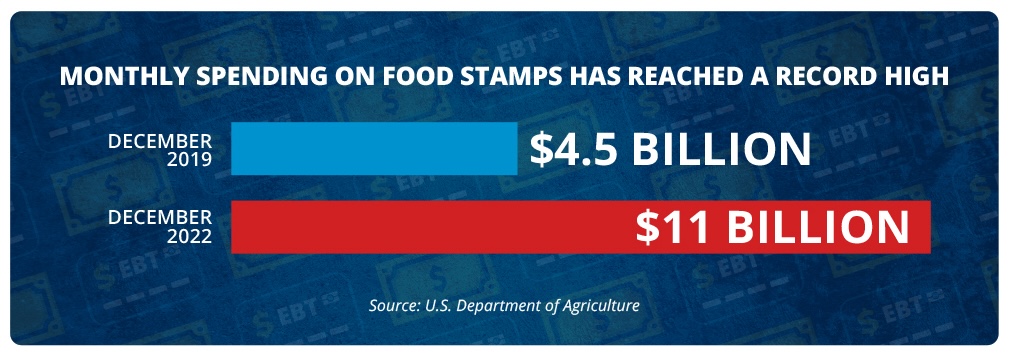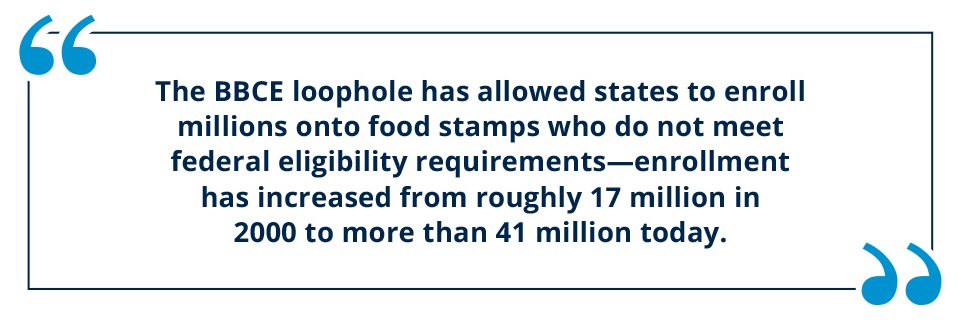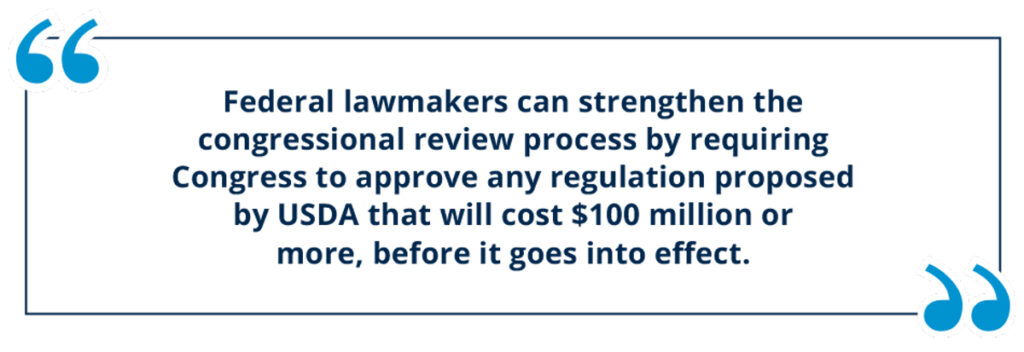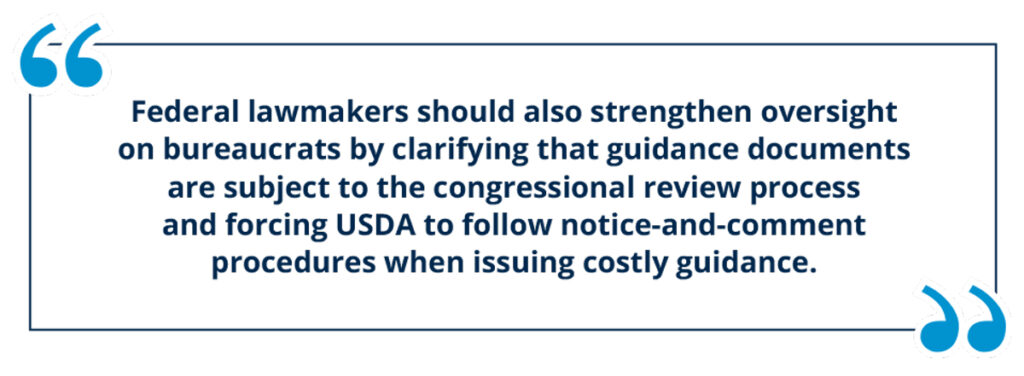How USDA Sidesteps Congress to Rewrite Laws and Expand Welfare
- BY Haley Holik
Key Findings
- Food stamp spending has soared under the Biden administration, reaching record highs in 2022.
- The U.S. Department of Agriculture’s (USDA) Food and Nutrition Service (FNS) has a history of abusing regulatory power to expand welfare, all while siphoning scarce resources from the truly needy and imposing massive costs on taxpayers.
- Federal lawmakers should require congressional approval for USDA regulations with an annual price tag of $100 million before they can take effect.
- Congress should rein in rogue regulators by requiring USDA to follow notice-and-comment procedures when issuing costly guidance.
Overview
Food stamp spending has skyrocketed under the Biden administration, reaching record highs in 2022.1 Program spending surged from $60 billion in 2019 to $119.5 billion in 2022—nearly doubling over the span of a few years.2 Put another way, food stamp spending went from roughly $4.5 billion per month in December 2019 to nearly $11 billion per month in December 2022.3

The majority of the recent increase in spending on the food stamp program can be directly attributed to decisions made by USDA officials.4 In 2021, the Biden administration unilaterally implemented the largest food stamp expansion in the program’s history, increasing benefits by an average of 27 percent.5 This regulatory action comes with a massive price tag, costing taxpayers up to $250 billion over the next 10 years—assuming that bureaucrats do not expand benefits again.6
Unsurprisingly, this is far from the first time FNS has bypassed Congress to expand welfare and impose massive costs on taxpayers. The Clinton administration used guidance to create the
broad-based categorical eligibility (BBCE) loophole.7 And the Obama administration spent years urging states to exploit the BBCE loophole, before FNS issued a rule to expand BBCE policies.8-10 The BBCE loophole has allowed states to enroll millions onto food stamps who do not meet federal eligibility requirements—enrollment has increased from roughly 17 million in 2000 to more than 41 million today.11-12 As a result, food stamp spending is currently on track to surpass $1 trillion over the next decade.13

Federal lawmakers should strengthen congressional oversight of the rulemaking process to prevent bureaucratic expansions of welfare from happening in the future. Congress should require congressional approval of USDA regulations that will cost $100 million or more before they can take effect. To prevent bureaucrats from sidestepping congressional oversight, lawmakers should also clarify that regulatory guidance is subject to the Congressional Review Act (CRA) and require USDA to follow notice-and-comment procedures when issuing costly guidance.
FNS bypassed Congress to push the largest food stamp expansion in program history
In 2021, the Biden administration rushed through the largest permanent increase in food stamp program history, hiking benefits by 27 percent.14 Biden administration bureaucrats expanded welfare by reevaluating the Thrifty Food Plan—the basket of foods that form the basis of food stamp benefits.15 In doing so, USDA violated internal control standards, abandoned a 45-year cost neutrality requirement, canceled peer reviews, and ignored USDA’s chief economist.16 The Government Accountability Office concluded that this policy change was subject to the CRA and should have been submitted to Congress for review.17-18

President Biden’s unilateral food stamp expansion will ultimately cost taxpayers up to $250 billion over the next decade, assuming bureaucrats do not use similar tactics to expand food stamp benefits again.19 This welfare expansion is fueling inflation.20 The expansion of the food stamp program sets a dangerous precedent, allowing unelected bureaucrats to bypass Congress and impose massive costs on the public. But this is not the first time that FNS has sidestepped Congress to rewrite duly enacted laws and expand welfare.
FNS used guidance to create the BBCE loophole, then expanded it through a rule
Under federal law, individuals can be categorically eligible for food stamps if they receive a benefit from other welfare programs like the Temporary Assistance for Needy Families (TANF) program.21-22 But the Clinton administration used guidance to expand the scope of what is considered a benefit to include non-cash and in-kind benefits.23 And the Obama administration spent years issuing guidance on how states can game the system.24-27
At the urging of federal guidance, states began using TANF funding to print brochures and operate toll-free hotlines.28 By receiving a brochure or information on a toll-free hotline, individuals are deemed to have received a TANF benefit, which allows states to bypass eligibility standards of the food stamp program—eligibility standards designed to protect scarce resources for the truly needy.29
Even worse, FNS issued a rule expanding the loophole, allowing states to grant eligibility to individuals who never receive a benefit but are merely “authorized to receive” a benefit.30-31 The Office of Inspector General advised USDA that its BBCE policies were unlawful, yet states continue to exploit the BBCE loophole and divert resources away from the truly needy.32
There are more than 5.4 million enrollees on food stamps who have been enrolled through BBCE and do not meet eligibility requirements.33-34 Closing the BBCE loophole would preserve resources for the most vulnerable, all while saving taxpayers billions over the next decade.35 Fortunately, Congress can rein in FNS by strengthening legislative oversight of the regulatory process.
Federal lawmakers can rein in regulatory spending by requiring congressional approval for USDA regulations before they take effect
The CRA provides Congress with fast-track procedures to review and overturn regulations like the BBCE loophole.36-37 But the regulatory review process favors unelected bureaucrats, as Congress must take action to pass a joint resolution of disapproval, which is subject to veto. Federal lawmakers can strengthen the congressional review process by requiring Congress to approve any regulation proposed by USDA that will cost $100 million or more, before it goes into effect.38 A similar state-level policy in Florida has been successful at reining in rogue bureaucrats in the Department of Agriculture and Consumer Services.39-40

Many regulatory actions are subject to the congressional review process, even if they are not subject to notice-and-comment requirements.41 And Congress has used the CRA to overturn guidance.42 Even so, agencies may skirt congressional review and public input. Unlike a rule, an agency is not generally required to follow public notice-and-comment procedures before issuing a guidance document, even though it may have the same effect as a rule.43 As a result, agencies may fail to submit costly guidance for congressional review.44
Federal lawmakers can prevent bureaucrats from using guidance to sidestep congressional review by clarifying that guidance is subject to the CRA. And to ensure FNS submits the most burdensome, costly regulations for review, Congress should force USDA to follow notice-and-comment procedures when issuing guidance that carries an annual price tag of $100 million.
The Bottom Line: Congress should rein in USDA.
FNS has a history of abusing regulatory power to expand welfare and impose massive costs on taxpayers. FNS used guidance to create the BBCE loophole and opened the door to ineligible enrollees on food stamps. FNS also issued a rule to expand the loophole to divert even more resources away from the truly needy, and spending on the food stamp program has soared in recent years due to unilateral decisions from agency officials.
Congress should act to rein in regulatory spending by requiring congressional approval of USDA regulations that will cost $100 million or more before they can take effect. Federal lawmakers should also strengthen oversight on bureaucrats by clarifying that guidance documents are subject to the congressional review process and forcing USDA to follow notice-and-comment procedures when issuing costly guidance.

REFERENCES
1 Liesel Crocker, “Five ways that Congress can put a stop to food stamp fraud,” Foundation for Government Accountability (2023), https://thefga.org/research/five-ways-congress-can-stop-food-stamp-fraud.
2 Ibid.
3 Jonathan Ingram, “Feeding inflation: How President Biden’s unlawful food stamp expansion is costing taxpayers and consumers billions,” Foundation for Government Accountability (2023), https://thefga.org/research/feeding-inflation-bidens-unlawful-food-stamp-expansion.
4 Ibid.
5 Ibid.
6 Ibid.
7 Jonathan Ingram, “Closing the door to food stamp fraud: How ending broad-based categorical eligibility can protect the truly needy,” Foundation for Government Accountability (2018), https://thefga.org/research/closing-the-door-to-food-stamp-fraud-how-ending-broad-based-categorical-eligibility-can-protect-the-truly-needy.
8 Ibid.
9 7 C.F.R. § 273.2(j)(2) (2018), https://www.ecfr.gov/current/title-7/subtitle-B/chapter-II/subchapter-C/part-273.
10 Sam Adolphsen, “Closing the door to food stamp fraud,” Foundation for Government Accountability (2020), https://docs.house.gov/meetings/GO/GO05/20200206/110454/HHRG-116-GO05-Wstate-AdolphsenS-20200206.pdf.
11 Paige Terryberry, “How Congress can protect the truly needy and restore program integrity to food stamps by ending broad-based categorical eligibility,” Foundation for Government Accountability (2023), https://thefga.org/research/how-congress-can-protect-needy-by-ending-bbce.
12 Food and Nutrition Services, “Supplemental Nutrition Assistance Program participation and costs,” U.S. Department of Agriculture (2023), https://fns-prod.azureedge.us/sites/default/files/resource-files/snap-annualsummary-10.pdf.
13 Paige Terryberry, “How Congress can protect the truly needy and restore program integrity to food stamps by ending broad-based categorical eligibility,” Foundation for Government Accountability (2023), https://thefga.org/research/how-congress-can-protect-needy-by-ending-bbce.
14 Jonathan Ingram, “Feeding inflation: How President Biden’s unlawful food stamp expansion is costing taxpayers and consumers billions,” Foundation for Government Accountability (2023), https://thefga.org/research/feeding-inflation-bidens-unlawful-food-stamp-expansion.
15 Jonathan Ingram and Hayden Dublois, “President Biden unilaterally and unlawfully increased food stamp benefits,” Foundation for Government Accountability (2023), https://thefga.org/research/president-biden-increased-food-stamp-benefits.
16 Jonathan Ingram, “Feeding inflation: How President Biden’s unlawful food stamp expansion is costing taxpayers and consumers billions,” Foundation for Government Accountability (2023), https://thefga.org/research/feeding-inflation-bidens-unlawful-food-stamp-expansion.
17 U.S. Government Accountability Office, “United States Department of Agriculture—Applicability of the Congressional Review Act of the 2021 updates to the Thrifty Food Plan,” U.S. Government Accountability Office (2022), https://www.gao.gov/assets/730/721951.pdf.
18 Jonathan Bain, “How Biden’s massive increase in food stamps is fueling the worker shortage,” Foundation for Government Accountability (2023), https://thefga.org/research/bidens-increase-food-stamps-fueling-worker-shortage/.
19 Jonathan Ingram, “Feeding inflation: How President Biden’s unlawful food stamp expansion is costing taxpayers and consumers billions,” Foundation for Government Accountability (2023), https://thefga.org/research/feeding-inflation-bidens-unlawful-food-stamp-expansion.
20 Ibid.
21 7 U.S.C. § 2014(a).
22 Paige Terryberry, “How Congress can protect the truly needy and restore program integrity to food stamps by ending broad-based categorical eligibility,” Foundation for Government Accountability (2023), https://thefga.org/research/how-congress-can-protect-needy-by-ending-bbce.
23 Food and Nutrition Services, “Letters to regions on categorical eligibility,” U.S. Department of Agriculture (1999), https://www.fns.usda.gov/snap/letter-regions-categorical-eligibility.
24 Food and Nutrition Services, “Improving access to SNAP through broad-based categorical eligibility,” U.S. Department of Agriculture (2009), https://www.fns.usda.gov/snap/eligibility/BBCE-improving-access.
25 Food and Nutrition Service, “Categorical eligibility questions and answers,” U.S. Department of Agriculture (2010), https://www.fns.usda.gov/snap/eligibility/BBCE-questions-answers.
26 Food and Nutrition Service, “Questions and answers on broad-based categorical eligibility,” U.S. Department of Agriculture (2011), https://www.fns.usda.gov/snap/questions-and-answers-broad-based-categorical-eligibility.
27 Food and Nutrition Service, “Clarification on characteristics of broad-based categorical eligibility programs,” U.S. Department of Agriculture (2016), https://www.fns.usda.gov/snap/eligibility/BBCE-characteristics-clarification.
28 Sam Adolphsen, “Closing the door to food stamp fraud,” Foundation for Government Accountability (2020), https://docs.house.gov/meetings/GO/GO05/20200206/110454/HHRG-116-GO05-Wstate-AdolphsenS-20200206.pdf.
29 Ibid.
30 Office of Inspector General, “FNS quality control process for SNAP error rate,” U.S. Department of Agriculture (2015), https://usdaoig.oversight.gov/reports/audit/fns-quality-control-process-snap-error-rate.
31 7 C.F.R. § 273.2(j)(2) (2018), https://www.ecfr.gov/current/title-7/subtitle-B/chapter-II/subchapter-C/part-273.
32 Office of Inspector General, “FNS quality control process for SNAP error rate,” U.S. Department of Agriculture (2015), https://usdaoig.oversight.gov/reports/audit/fns-quality-control-process-snap-error-rate.
33 Jonathan Ingram, “Closing the door to food stamp fraud: How ending broad-based categorical eligibility can protect the truly needy,” Foundation for Government Accountability (2018), https://thefga.org/research/closing-the-door-to-food-stamp-fraud-how-ending-broad-based-categorical-eligibility-can-protect-the-truly-needy.
34 Jonathan Ingram, “Why closing the broad-based categorical eligibility loophole will not bust state budgets,” Foundation for Government Accountability (2019), https://thefga.org/research/why-closing-the-broad-based-categorical-eligibility-loophole-will-not-bust-state-budgets.
35 Paige Terryberry, “How Congress can protect the truly needy and restore program integrity to food stamps by ending broad-based categorical eligibility,” Foundation for Government Accountability (2023), https://thefga.org/research/how-congress-can-protect-needy-by-ending-bbce.
36 Haley Holik and Alli Fick, “How lawmakers can rein in regulations like the student loan bailout,” Foundation for Government Accountability (2023), https://thefga.org/research/lawmakers-can-rein-in-regulations-like-student.loan-bailout.
37 5 U.S.C. §§ 801-808.
38 Jonathan Ingram, et al., “Congress must rein in President Biden’s regulatory spending spree to tame inflation,” Foundation for Government Accountability (2023), https://thefga.org/research/congress-must-rein-spending-to-tame-inflation.
39 Haley Holik, “How legislative and executive oversight helps Florida cut and control red tape,” Foundation for Government Accountability (2023), https://thefga.org/research/legislative-executive-oversight-helps-florida-cut-control-red-tape.
40 Haley Holik, “Why Florida is a national model for regulatory reform,” Foundation for Government Accountability (2022), https://thefga.org/research/florida-is-a-national-model-for-regulatory-reform.
41 Congressional Research Service, “The Congressional Review Act: Defining a ‘rule’ and overturning a rule an agency did not submit to Congress,” Congressional Research Service (2019), https://crsreports.congress.gov/product/pdf/IF/IF11096.
42 Haley Holik and Alli Fick, “How lawmakers can rein in regulations like the student loan bailout,” Foundation for Government Accountability (2023), https://thefga.org/research/lawmakers-can-rein-in-regulations-like-student.loan-bailout.
43 Ibid.
44 Congressional Research Service, “The Congressional Review Act: Defining a ‘rule’ and overturning a rule an agency did not submit to Congress,” Congressional Research Service (2019), https://crsreports.congress.gov/product/pdf/IF/IF11096.
